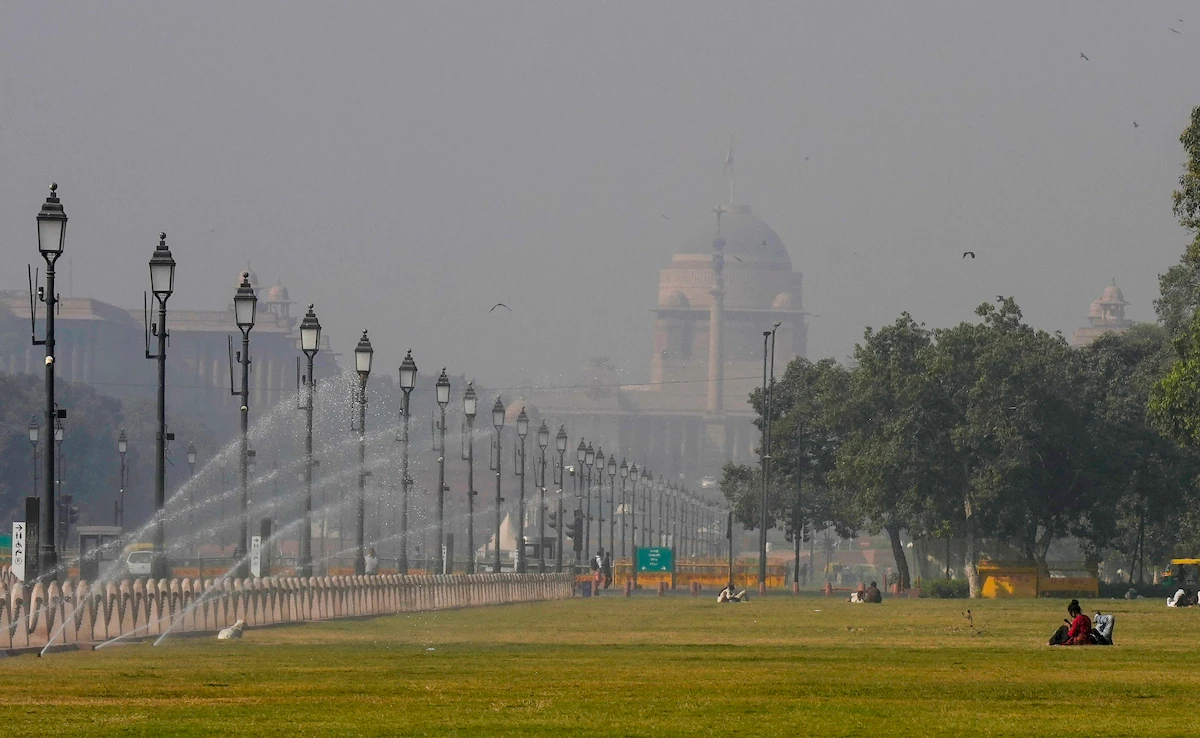- Courses
- GS Full Course 1 Year
- GS Full Course 2 Year
- GS Full Course 3 Year
- GS Full Course Till Selection
- Answer Alpha: Mains 2025 Mentorship
- MEP (Mains Enrichment Programme) Data, Facts
- Essay Target – 150+ Marks
- Online Program
- GS Recorded Course
- NCERT- First Ladder
- Polity
- Geography
- Economy
- Ancient, Medieval and Art & Culture AMAC
- Modern India, Post Independence & World History
- Environment
- Governance
- Science & Technology
- International Relations and Internal Security
- Disaster Management
- Ethics
- Current Affairs
- Indian Society and Social Issue
- CSAT
- 5 LAYERED ARJUNA Mentorship
- Public Administration Optional
- ABOUT US
- OUR TOPPERS
- TEST SERIES
- FREE STUDY MATERIAL
- VIDEOS
- CONTACT US
Constitutional Morality as a Challenge
Constitutional Morality as a Challenge
26-07-2024
The arrest of a serving chief minister on corruption charges brings up several legal, political, and constitutional questions. It also challenges the adherence to constitutional morality in a parliamentary democracy like India.
Allahabad High Court Judgment in Kiran Rawat vs State of UP
|
About the Constitutional Morality
- Constitutional morality refers to the principles and values embedded (included) in a constitution that guide the actions of both the government and its citizens.
- The concept was introduced by British Classicist George Grote in the 19th century, who defined it as a “paramount reverence for the forms of the Constitution.” [paramount = supreme]
- In India, Dr. B.R. Ambedkar was the 1st to use the term.
Core Elements of Constitutional Morality
-
Constitutional Values: Uphold the core values enshrined in the Constitution, such as justice, liberty, equality, fraternity, secularism, and individual dignity.
-
Rule of Law: Ensure that everyone, including government officials, is subject to and accountable under the law.
-
Democratic Principles: Facilitate the functioning of a representative democracy where citizens participate in decision-making and hold their representatives accountable.
-
Fundamental Rights: Respect and protect the fundamental rights guaranteed by the constitution, such as equality, freedom of speech, and the right to life and personal liberty.
-
Separation of Powers: Maintain a balance of power among the legislative, executive, and judicial branches to prevent any single branch from becoming too powerful.
-
Checks and Balances: Implement mechanisms and institutions that prevent abuse of power and protect individual rights.
-
Constitutional Interpretation: Interpret the constitution in ways that promote its principles and adapt to changing societal needs.
-
Ethical Governance: Ensure ethical conduct, transparency, accountability, and integrity in public service.
Constitutional Morality and the Indian Constitution
- The term "constitutional morality" is not explicitly stated in the Indian Constitution.
- The concept is intrinsic (essential) to the Constitution’s core values, such as justice, equality, and liberty.
- These values are embedded in various sections of the Constitution, including the Preamble, Fundamental Rights, and Directive Principles of State Policy.
- The essence of constitutional morality is also evident in numerous Supreme Court judgments.
Major Judgments Upholding Constitutional Morality
-
Kesavananda Bharati v. State of Kerala, 1973: Established the "basic structure doctrine," limiting Parliament's power to amend the Constitution and ensuring its core principles remain intact.
- This case is an early example of the court upholding the Constitution's spirit.
-
SP Gupta Case (First Judges Case), 1982: The Supreme Court recognized a constitutional breach as a severe violation of constitutional morality.
-
Naz Foundation v. Government of NCT of Delhi, 2009: Decriminalized consensual same-sex relationships between adults.
- The court emphasized that "constitutional morality" should prevail over societal norms, protecting individual rights.
-
Indian Young Lawyers Association v. State of Kerala (Sabarimala Case), 2018: The court struck down the practice of excluding women of a certain age group from the Sabarimala temple.
- It highlighted that "constitutional morality" encompasses justice, equality, liberty, and fraternity, which surpass religious customs that restrict women's entry.
-
Navtej Singh Johar v. Union of India, 2018: This judgment read down Section 377 of the Indian Penal Code, which criminalized homosexuality.
-
Joseph Shine vs Union of India (2018): Struck down the law on adultery, declaring it an infringement on the rights to equality, dignity, privacy, and autonomy.
-
Shafin Jahan vs Asokan K.M. (2018): Upheld the right to marry a person of one's choice regardless of religion or caste, overturning the annulment of a Hindu-Muslim marriage.
-
Shakti Vahini vs Union of India (2018): Condemned honour killings and violence against inter-caste and inter-religious couples, setting guidelines for their prevention and protection.
Challenges of Upholding Constitutional Morality
-
Absence of a Precise Definition: The concept of constitutional morality lacks a precise definition, causing diverse interpretations influenced by individual viewpoints.
-
Encouragement of Judicial Dominance: Emphasizing constitutional morality can elevate (raise) judicial authority, leading to judicial involvement in legislative functions.
- This involvement breaches the separation of powers principle.
-
Clashes with Popular and Religious Values: Constitutional morality can sometimes oppose popular morals or religious beliefs.
- Such clashes may trigger social unrest and opposition.
- Notable instances include the Supreme Court's decisions on decriminalizing homosexuality and permitting women's entry into the Sabarimala temple, which faced protests from certain societal groups.
-
Impact of Political and Personal Influences: Constitutional morality can be swayed (swing) by political motives or personal biases.
- These influences can compromise the objectivity and integrity of constitutional principles.
- For instance, the recent changes to the appointment committee for the Election Commission of India and the amended IT Rules 2023 have faced criticism for political interference.
-
Judicial Activism vs. Judicial Restraint: Finding a balance between judicial activism and judicial restraint is challenging.
- While judicial activism can uphold rights and constitutional values, excessive activism can intrude on executive and legislative domains.
- Judicial activism and Judicial restraint are the two terms used to describe the philosophy and motivation behind some judicial decision.
- Judicial activism refers to a theory of judgment that takes into account the spirit of the law and the changing times, while judicial restraint relies on a strict interpretation of the law and the importance of legal precedent.
- Judicial Restraint is a theory of judicial interpretation that encourages judges to limit the exercise of their own power. It asserts that judges should hesitate to strike down laws unless they are obviously unconstitutional.
-
Enforcement and Compliance Issues: Despite a strong constitutional framework, effective enforcement and adherence are challenging.
- Problems such as implementation gaps, delays in justice delivery, and lack of public awareness about constitutional rights contribute to these challenges.
Steps Need to be Taken to Uphold Constitutional Morality
-
Clear Definition and Understanding: Establish a clear and comprehensive definition of constitutional morality to provide a solid foundation for its interpretation and application.
-
Public Awareness and Education: Promote public awareness and education about constitutional morality.
- Enhance civic education, conduct public discussions, and engage with various stakeholders to foster a deeper understanding of its principles.
-
Judicial Restraint and Respect for Separation of Powers: Focus on judicial restraint and respect for the separation of powers to address concerns about judicial supremacy.
- The judiciary should exercise caution in legislative matters and maintain a balance between upholding constitutional values and respecting other branches of government.
-
Strengthening Institutions:
- Uphold constitutional morality by strengthening the independence, integrity, and effectiveness of institutions like the Election Commission, National Investigation Agency (NIA), and Central Bureau of Investigation (CBI).
- Ensure transparent appointments, reduce political interference, and enhance accountability mechanisms.
-
Promoting Civic Education: Increase public awareness and understanding of constitutional rights and values, especially among the youth.
- Implement civic education programs in schools and colleges to instil (inculcate) a sense of constitutional responsibility and empower citizens to participate meaningfully in democratic processes.
-
Enhancing Access to Justice: Improve access to justice, particularly for marginalized and vulnerable communities, to uphold constitutional principles.
- Expand legal aid services, reduce judicial backlog, simplify legal procedures, and promote alternative dispute resolution mechanisms.
-
Encouraging Ethical Leadership: Promote ethical leadership and governance practices at all levels to uphold constitutional values.
- Leaders and public officials should demonstrate integrity, accountability, and a commitment to serving the public interest, setting a positive example for society.
-
Adapting to Evolving Challenges
- Continuously adapt legal and institutional frameworks to address emerging challenges to constitutional morality.
- These include technological advancements, globalization, and environmental concerns, ensuring relevance and effectiveness.
Do Chief Ministers in India Lack Immunity from Arrests?
|



